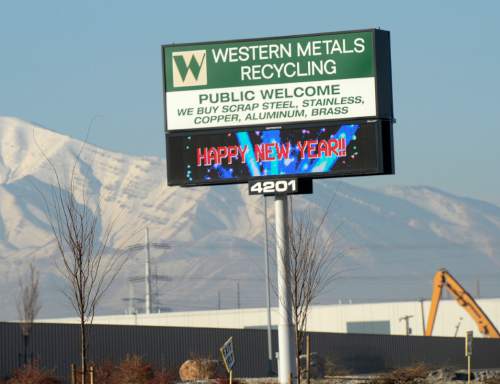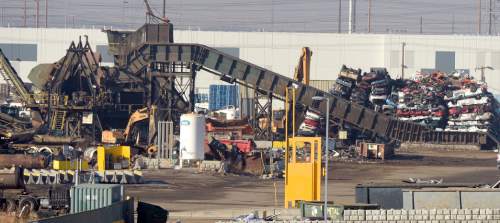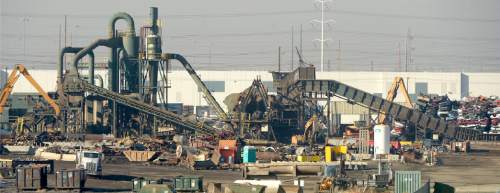This is an archived article that was published on sltrib.com in 2015, and information in the article may be outdated. It is provided only for personal research purposes and may not be reprinted.
A bill sliding through the Senate would prohibit Utah environmental regulators from requiring auto recyclers to pull greasy oil filters from engine blocks.
Sen. Scott Jenkins, R-Plain City, introduced SB171 at the request of Western Metals Recycling, which is fighting the Utah Department of Environmental Quality.
The agency slapped the firm with a notice of violation for its refusal to remove and drain oil filters from engine blocks.
But the company maintains removing the filters is dangerous and is contesting the violation before an administrative law judge.
Neither the U.S. Environmental Protection Agency nor any other state requires filter removal, Jenkins told the Senate Business and Labor Committee earlier this week. Nor does Utah for that matter.
But many states say they should be drained or they will be considered hazardous waste, according to Utah Division of Solid and Hazardous Waste Director Scott Anderson.
"The question we have posed to Western Metals is this: 'How are you going to claim the exemption [from solid-waste handling rules] if you don't drain the filter? And how are you going to drain the filter if you don't remove it from the engine block?'" Anderson said. "I'm not sure what the bill does. It doesn't do anything to change the way we do business."
Undrained filters hold about a pint of motor oil that is rich in heavy metals and other harmful chemicals.
"Once the oil is out of there, you can get the exemption and recycle [the filter] as scrap metal," Anderson said. If not, "when you shred that engine block, that oil has to go somewhere."
More often than not, that somewhere is on the "fluff" — auto remnants destined for landfills, including upholstery and other metal components — and on the ground.
Western Metals, a Nucor subsidiary that feeds its northern Utah steel mill, says DEQ's insistence on oil filter removal would unnecessarily harm its business.
"Auto recyclers across the country were surprised by Utah's interpretation of the oil filter law," executive Jeremy McRoberts told lawmakers on Tuesday. "This interpretation will cause more harm to the environment and more opportunities for spillage."
But that claim is at odds with recommendations the EPA and other states offer to auto salvage yards, explaining the best practices for removing old oil from filters. Operators should heat the filters, the instructions say, puncture their tops and then drain them for 24 hours into a receptacle that will capture all the oil.
A pamphlet published by Kansas State University's Small Business Environmental Assistant Program in unequivocal.
"Do not leave oil filters on engines," it states. "Do not drain, crush, or store used oil filters on unprotected ground."
Utah senators unanimously advanced SB171 to a consent calendar on Wednesday, but only after Jenkins agreed to remove a far more controversial provision, which would have banned local health boards from regulating "a crusher, dismantler or scrap-metal processor."
That piece of the legislation blindsided the Salt Lake County Health Department, which has been negotiating new rules with scrap-metal recyclers for months.
The department regulates firms that salvage electronics and tires and hopes to oversee scrap-metal businesses, including making annual and random inspections at the 30 or so sites in the county, according to Dorothy Adams, the health department's deputy director.
DEQ lacks "the people power to go to every [scrap-metal] industry," Adams said. "It's not just used oil,"
Processing old cars can release gasoline, antifreeze, battery acid and transmission fluid.
"We need to make sure how and where they extract hazardous waste is done in a manner where public health is protected," Adams said.
But Jenkins contends local health departments are now trying regulate areas where they have no business.
"It's amazing to me to see how they are starting to grow and the influence they are exerting across the spectrum," he told the committee. "This [metal recycling] is just one item in that spectrum and it happens over and over."
At one point, Jenkins lapsed into a long explanation of onerous health department requirements for using two spatulas to flip burgers at public events — one for putting the raw meat on the grill, the other to take the cooked patty off.
Western Metals' McRoberts alleged the county is orchestrating "a money grab" with "excessive and redundant" requirements and taxes on scrap yards, while the industry already gets adequate oversight from state and federal authorities.
"The Health Department has repeatedly tried to destroy scrap-metal recycling and automotive dismantling by imposing impossible regulations," he said.
Metal recyclers alleged the county hopes to reclassify scrap-metal yards as landfills. Such a move would impose millions of dollars in costs to meet tough solid-waste standards and devise closure plans, according to lobbyist Rob Jolley.
"Most of those companies could not afford that," Jolley said. "Most are working in a garage where they strip down vehicles and sell the parts to my client, LKQ," a Chicago-based metal processor.
Adams rejected claims that the county proposed treating recyclers as landfills, arguing health officials have been responsive to the scrap-metal industry's concerns and plan to tailor a regulation that fits businesses' needs.
Twitter: @brianmaffly







